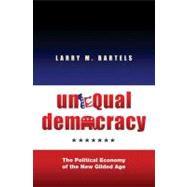
Note: Supplemental materials are not guaranteed with Rental or Used book purchases.
Purchase Benefits
| Preface | p. ix |
| The New Gilded Age | p. 1 |
| Escalating Economic Inequality | p. 6 |
| Interpreting Inequality | p. 13 |
| Economic Inequality as a Po litical Issue 19 Inequality and American Democracy | p. 23 |
| The Partisan Political Economy | p. 29 |
| Partisan Patterns of Income Growth | p. 31 |
| A Partisan Coincidence? | p. 34 |
| Partisan Differences in Macroeconomic Policy | p. 42 |
| Macroeconomic Per for mance and Income Growth | p. 47 |
| Partisan Policies and Post- Tax Income Growth | p. 54 |
| Democrats, Republicans, and the Rise of In equality | p. 61 |
| Class Politics and Partisan Change | p. 64 |
| In Search of the Working Class | p. 66 |
| Has the White Working Class Abandoned the Democratic Party? | p. 72 |
| Have Working- Class Whites Become More Conservative? | p. 78 |
| Do "Moral Values" Trump Economics? | p. 83 |
| Are Religious Voters Distracted from Economic Issues? | p. 90 |
| Class Politics, Alive and Well | p. 93 |
| Partisan Biases in Economic Accountability | p. 98 |
| Myopic Voters | p. 99 |
| The Political Timing of Income Growth | p. 104 |
| Class Biases in Economic Voting | p. 110 |
| The Wealthy Give Something Back: Partisan Biases in Campaign Spending | p. 116 |
| Political Consequences of Biased Accountability | p. 120 |
| Do Americans Care about In equality? | p. 127 |
| Egalitarian Values | p. 130 |
| Rich and Poor | p. 136 |
| Perceptions of Inequality | p. 143 |
| Facts and Values in the Realm of In equality | p. 148 |
| Homer Gets a Tax Cut | p. 162 |
| The Bush Tax Cuts | p. 164 |
| Public Support for the Tax Cuts | p. 170 |
| Unenlightened Self- Interest | p. 176 |
| The Impact of Political Information | p. 181 |
| Chump Change | p. 186 |
| Into the Sunset | p. 193 |
| The Strange Appeal of Estate Tax Repeal | p. 197 |
| Public Support for Estate Tax Repeal | p. 198 |
| Is Public Support for Repeal a Product of Misinformation? | p. 205 |
| Did Interest Groups Manufacture Public Antipathy to the Estate Tax? | p. 214 |
| Elite Ideology and the Politics of Estate Tax Repeal | p. 217 |
| The Eroding Minimum Wage | p. 223 |
| The Economic Effects of the Minimum Wage | p. 227 |
| Public Support for the Minimum Wage | p. 229 |
| The Politics of Inaction | p. 232 |
| Democrats, Unions, and the Eroding Minimum Wage | p. 239 |
| The Earned Income Tax Credit | p. 246 |
| Reversing the Tide | p. 247 |
| Economic Inequality and Po litical Representation | p. 252 |
| Ideological Representation | p. 254 |
| Unequal Responsiveness | p. 257 |
| Unequal Responsiveness on Social Issues: The Case of Abortion | p. 265 |
| Partisan Differences in Repre sen ta tion | p. 267 |
| Why Are the Poor Unrepresented? | p. 275 |
| Unequal Democracy | p. 283 |
| Who Governs? | p. 285 |
| Partisan Politics and the "Have- Nots" | p. 288 |
| Political Obstacles to Economic Equality | p. 294 |
| The City of Utmost Necessity | p. 298 |
| Selected References | p. 305 |
| Table of Contents provided by Publisher. All Rights Reserved. |
The New copy of this book will include any supplemental materials advertised. Please check the title of the book to determine if it should include any access cards, study guides, lab manuals, CDs, etc.
The Used, Rental and eBook copies of this book are not guaranteed to include any supplemental materials. Typically, only the book itself is included. This is true even if the title states it includes any access cards, study guides, lab manuals, CDs, etc.